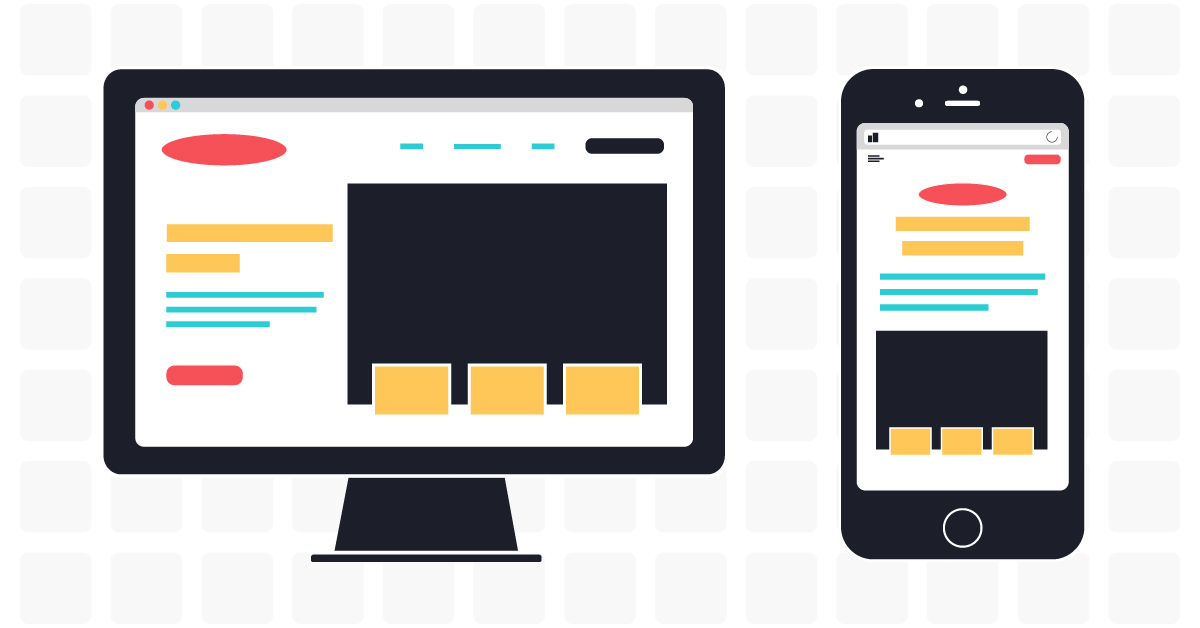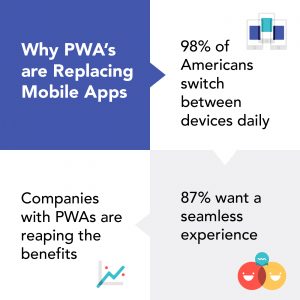
5 min read
The Changing Face of Web Application Development
Web App Development and Mobile App Development: A Blurred Line
We explore the definition of progressive web apps, and see why progressive web apps are blurring the lines between web and mobile app development to become the norm.
A recent article in TechTarget highlights a growing trend: web application development is changing. Custom web development used to be noticeably different than mobile app development. Web-based applications did one thing and mobile-based apps did things a little differently. Not anymore.
Today, the line between web and mobile applications is blurring. The resulting output is being termed Progressive Web Apps (PWAs).
What Are Progressive Web Apps?
So what is a progressive web app? A progressive web app, or PWA, refers to a website that looks and acts like a mobile app. These applications offer users a mobile-like experience, and the ability to access content instantly from a browser. This means users don’t need to visit an app store, download anything, or complete ongoing software updates to make use of the software. In a sentence, you can define a progressive web app as a website that looks and acts like a mobile app.
Why Choose Progressive Web Applications?
Progressive web apps offer many benefits. One major benefit of PWAs is their ability to leverage native mobile device features without burdening the user. With the built in features of progressive web apps, users can:
- Access features straight from the browser without making a purchase, downloading an app or using data
- Always enjoy the latest version of the app since it’s continually updated each time it’s launched
- Enjoy features including push notifications and multi-device hardware access
- Work offline if desired
- Save on build costs, since PWAs can be built faster and only one version needs to be created
PWAs also offer a great mobile experience, and can be an innovative game changer for any company who does them right.
Progressive Web Apps vs Native Apps: How Development Differs
Traditionally, mobile applications and web applications differed a good deal. However, this continues to change as the lines between the two blur.
Mobile App Development
Mobile applications are designed for a specific device or platform, such as Windows or iOS. This means that for every application, there needs to be multiple versions built specifically for the operating system its intricacies. Mobile applications can be used either on or offline. Generally, applications are built using Integrated Development Environments (IDE) and different languages based upon platform. In general, mobile apps:
- Are more expensive, and slower and more difficult to build
- Have more features and functionality than web apps
- Provide a faster user experience
Web App Development
Web applications are accessed using a browser and are responsive, so what is shown to the user changes or is adjusted depending on their device. There is no standard kit to develop a web app, and they can be built using various coding languages. Web apps tend to be:
- Quicker and easier to build
- More limited than mobile applications
- Not as rich a user experience
Progressive Web App Development
Developing a progressive web app is most like developing a web app. As described well by one expert, “It isn’t a new framework or technology. It is a set of best practices to make a web application function similar to a desktop or mobile application.”
Are Progressive Web Apps The Future?
The trend towards PWAs seems to be continuing, and it seems likely PWAs are the way of the future given the unique benefits they offer. Gartner believes PWAs will take center stage in future application development projects: “While traditional web app development projects will remain viable for some users, PWAs will replace 50 percent of general-purpose, customer-facing mobile apps by 2020.”
User expectations are driving this shift, as the continue to want an omnichannel, continuous experience across all of their many devices. Google found that 98 percent of Americans switch between devices daily and 87 percent think brands need to do more to provide a seamless experience. If they are shopping on a mobile device and decide to shift to their laptop, they want to see the same navigation, graphics and features. It can be confusing and create friction if there are multiple experiences.
According to a Forbes article, companies developing PWAs are reaping the benefits. For example, in regards to users of Pinterest’s PWA:
- Spent 40% more time on the site (compared to previous mobile website)
- Ad revenue rates increased by 44%
- Core engagements increased to 60%
This doesn’t mean that web or mobile app development will become obsolete. There will be cases where specific platform development is required, but custom app development companies will need to adapt their strategies, structure and capabilities to include this new push towards consolidated PWA development.




Leave a Reply